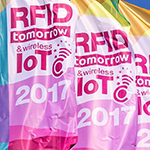
On 27th and 28th September the appointment which for the past few years has increasingly become the reference event for RFID took place in Düsseldorf, that is, RFID & Wireless IoT Tomorrow.
Two days during which it is possible to come face to face with its main players, discover technological & market trends but, above all, share experiences.
That said, we could not certainly miss it! And now we have tried and summarise the 3 most interesting aspects that have come to light:
1. IoT as Driving Force for RFID
After UHF frequency liberalization in 2007, RFID is now living a second childhood, driven by the growth of Internet of Things (IoT).
All technological vendors present themselves and produce from an IoT perspective, creating increasingly complex devices: sensors, RTLS (Real Time Locationing System) elements and other devices flank the automatic identification component, using communication protocols devoted to the industrial world.
2. BLE Wireless Technology as a Trend
Bluetooth Low Energy technology is based on standard Bluetooth 4.0 and is born to adapt itself to marketing logics on smartphone and tablet devices. Many entities are using it to enter the RTLS world, producing antennas that integrate RFID and BLE, suitable in shops for example to do inventories /trace garments (thanks to RFID) and at the same time localize staff (via a BLE badge).
3. Healthcare & Retail: Growing Markets
Analysts keep on saying that in the next 5 years it will be the Healthcare market to push IoT diffusion.
We will therefore increasingly hear about SMART hospitals, where RFID, BLE & WIFI will contribute in asset traceability (surgical instruments, PC’s, sheets…) and people (doctors, nurses, patients…) for a more efficient management.
Also worth mentioning, in the Retail world, the case of a supermarket that tagged all its fresh products and monitored them for a year (expiry date, replenishment, stock and waste).
The results obtained certainly make us reflect:
• 50% time reduction when performing activities in the supermarket,
• 33% reduction of empty shelves,
• 35% reduction of meat thrown away,
• 7% increase in sales income (this due to the fact that the supermarket carried out fewer promotions to sell out expiring goods than the previous year).
Although then we come to wonder:
This last question does not only concern Retail, but also all other markets: suffice it to say that Volkswagen logistics company (which has provided all their lorries with an RFID & GPS system for deliveries traceability) must manage 120,000 orders per day.
Therefore great success and great prospects for the IoT world, but perhaps the real step forward towards its true practicable spread in everyday life will only take place when any given item will be conceived, before being produced, as a “speaking” object, that is to say, when the RFID chip will become an essential component of the article itself.